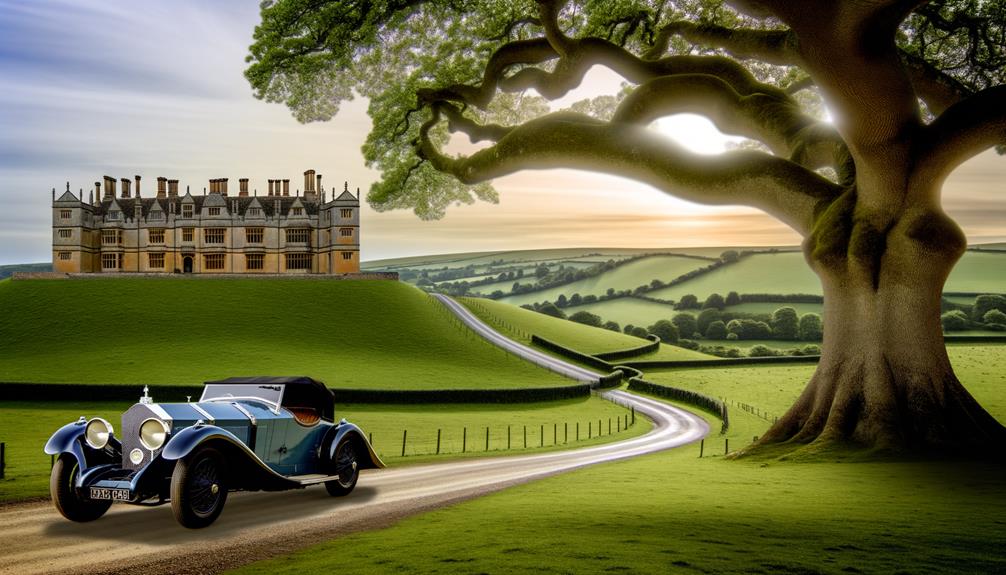Bentley Name Meaning and Origin
The name Bentley originates from Old English, combining 'beonet,' meaning bent grass, with 'leah,' denoting a woodland clearing. Historical records first document its usage in Yorkshire and Derbyshire, emphasizing its role as a geographical identifier linked to meadows of bent grass.
The Domesday Book of 1086 further attests to Bentley's deep historical roots. Over time, the name has become emblematic of English topography and agrarian life.
Today, Bentley enjoys modern popularity, partly due to its association with the luxury automobile brand. Stay to uncover more about its cultural significance and famous bearers.

Key Takeaways
- Bentley originates from Old English, combining 'beonet' (bent grass) and 'leah' (woodland clearing).
- It was initially a geographical identifier for those near bent grass meadows.
- The name appears in historical records, including the Domesday Book of 1086.
- Bentley reflects medieval English settlement patterns and agrarian lifestyles.
- Modern popularity is bolstered by luxury connotations and media exposure.
Historical Background
The name Bentley has its origins in Old English, derived from the words 'beonet,' meaning bent grass, and 'leah,' meaning a woodland clearing or meadow.
Historical records indicate that the name Bentley was first used in England during the Anglo-Saxon period, mainly in the regions of Yorkshire and Derbyshire. The name often denoted individuals who lived near or within a bent grass meadow, serving as a geographical identifier.
The Domesday Book of 1086, a manuscript record of the 'Great Survey' of England, contains several mentions of places named Bentley, emphasizing its early significance.
Over centuries, the name Bentley evolved from a topographical descriptor to a surname, reflecting both the land's characteristics and the people who inhabited it.
Etymology of Bentley
Rooted in the Old English elements 'beonet' and 'leah,' Bentley's etymology reveals a connection to bent grass meadows and woodland clearings, encapsulating both natural features and early settlement practices. 'Beonet' refers to bent grass, a type of grass commonly found in meadows, while 'leah' denotes a wood or clearing. This name structure reflects the Anglo-Saxon custom of describing geographic features of a location. Historical records from the Domesday Book (1086) show various forms of Bentley, underscoring its longstanding usage.
| Old English Term | Meaning |
|---|---|
| beonet | Bent Grass |
| leah | Wood/Clearing |
| Bentley | Grass Meadow Clearing |
This linguistic composition highlights Bentley as a place deeply connected to its natural surroundings and early English topography.
Cultural Significance
Bentley, a name intertwined with the English landscape, carries cultural significance that extends beyond its linguistic roots, reflecting historical patterns of settlement and identity in medieval England. Originating from Old English terms ‘beonet’ (bent grass) and ‘leah’ (wood or clearing), the name Bentley denotes regions characterized by grassy fields and open woodland. The use of the name Bentley can be traced back to medieval times, and it has been associated with various noble families and estates across England. The Bradley name history, which also has roots in Old English, shares similar connections to the English landscape and has been associated with areas characterized by broad woodlands or meadows. Both Bentley and Bradley reflect the deep ties between language, culture, and the natural environment in England.
This nomenclature, prevalent in counties such as Yorkshire and Staffordshire, illustrates the agrarian lifestyle and geographical features that shaped local identities. Documented in the Domesday Book of 1086, Bentley underscores the importance of land and environment in medieval social structures.
The name's enduring presence in place names and family surnames highlights its integration into the fabric of English cultural heritage.
Modern Popularity
In contemporary times, the name Bentley has witnessed a remarkable resurgence in popularity, particularly in English-speaking countries, as evidenced by its frequent appearance in birth records and popular culture. Data from the Social Security Administration in the United States reveals a significant climb in the name's ranking over the past two decades.
This trend can be attributed to various factors:
- Media Influence: The name Bentley has appeared in numerous television shows and movies.
- Celebrity Usage: Several high-profile personalities have chosen Bentley for their offspring.
- Historical Appeal: The name carries a classic charm, appealing to modern parents seeking timeless names.
- Luxury Connotations: The association with the prestigious Bentley automobile brand adds an aura of sophistication.
These elements collectively underscore Bentley's modern appeal.
Famous Namesakes
Prominently, the name Bentley has been borne by various distinguished individuals across different fields, further cementing its legacy in contemporary culture.
One notable figure is W.O. Bentley, the British engineer who founded Bentley Motors Limited in 1919, revolutionizing the luxury automobile industry.
In academia, Arthur F. Bentley, an American political scientist, made significant contributions to empirical political theory during the early 20th century.
The entertainment industry boasts talents such as Wes Bentley, an American actor known for his roles in 'American Beauty' and 'The Hunger Games.'
These figures, among others, underscore the name Bentley's enduring presence and influence, spanning from pioneering engineering feats to impactful scholarly work and celebrated artistic achievements.
Conclusion
The name Bentley, with its rich historical background, etymological roots grounded in Old English, and significant cultural resonance, epitomizes a blend of tradition and modern appeal.
The rise in contemporary popularity underscores its enduring charm, while notable individuals bearing the name reinforce its distinguished legacy.
This confluence of historical depth, linguistic origin, cultural relevance, and modern recognition renders Bentley a name of considerable heritage and lasting significance.






